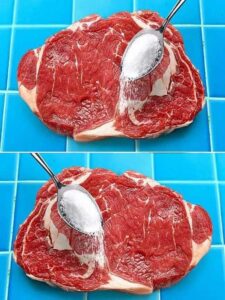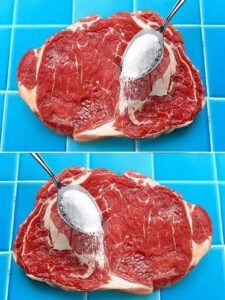Enhancing Meat Tenderization The Chefs Secret Ingredient Revealed

Tender, succulent meat is a hallmark of a memorable meal, but achieving that perfect texture can often feel like a culinary challenge. However, renowned chefs are unveiling a simple yet effective secret to elevate the tenderness of meat to unprecedented levels: the strategic addition of a specific ingredient before cooking.
In the realm of culinary expertise, the secret ingredient isn’t a rare herb or an exotic spice; it’s the power of time. Chefs emphasize the importance of allowing meat to undergo a process known as “pre-salting” or “dry-brining” before it hits the heat. This involves generously seasoning the meat with salt and allowing it to rest in the refrigerator for a designated period, typically ranging from several hours to overnight.
The science behind this technique is fascinating yet straightforward. Salt, when applied to meat, works its magic by drawing out moisture through osmosis. As the salt penetrates the meat, it dissolves muscle proteins, causing them to unwind and subsequently absorb the expelled moisture along with the dissolved salt. This process, although initially dehydrating, ultimately results in meat that is not only seasoned evenly but also remarkably tender and juicy.
Furthermore, the prolonged exposure to salt allows it to deeply penetrate the meat, enhancing its flavor from within. This means that even after cooking, every bite of the meat boasts a well-balanced seasoning throughout.
Chefs across various cuisines swear by this technique, incorporating it into their culinary repertoire to consistently deliver exceptional results. Whether preparing a tender steak, succulent chicken breast, or flavorful pork chop, the application of this simple yet transformative method can turn an ordinary dish into a culinary masterpiece.
It’s important to note that while salt plays a pivotal role in tenderizing meat, moderation is key. Over-salting can lead to an overly seasoned and unpleasant final product. Therefore, it’s advisable to exercise restraint and carefully adjust the amount of salt used based on the type and thickness of the meat being prepared.
In conclusion, achieving unparalleled tenderness in meat doesn’t require complex ingredients or elaborate techniques. By embracing the power of time and harnessing the transformative effects of salt through pre-salting, chefs unlock a simple yet potent secret to elevate their dishes to new heights of culinary excellence. So, the next time you’re preparing a meal, remember the chefs’ tip: sprinkle on the salt, give it time to work its magic, and savor the extraordinary results
While chefs typically rely on dry-brining with salt to enhance meat tenderness, there’s a new contrasting addition that has caught some attention: using fermented lemon brine. This method offers unique advantages in improving meat tenderness and adding a refreshing, acidic flavor to the dish.
When meat is immersed in fermented lemon brine, the acid in the lemon works to break down the protein fibers in the meat, making it more tender and easier to chew. Additionally, the acidic lemon flavor adds a touch of refreshment and vitality to the meat, enriching the dining experience in a distinctive way.
This new addition is intriguing for those seeking alternative methods to enhance the flavor and texture of meat, and it may be an exciting option to experiment with in the kitchen to add a touch of innovation to their traditional recipes.

Here’s some more information:
Fermented lemon brine offers a dynamic twist to traditional meat preparation techniques. The fermentation process imbues the lemon with complex flavors and probiotics, which not only tenderize the meat but also impart a depth of flavor that is both intriguing and delicious.
Moreover, the acidity of the fermented lemon brine acts as a natural tenderizer, similar to vinegar or citrus marinades, but with the added benefit of a unique tanginess that sets it apart. This acidity helps to break down tough muscle fibers in the meat, resulting in a more tender and juicy final product.
Furthermore, the fermented aspect adds a subtle complexity to the flavor profile, with hints of tangy brightness and a subtle umami undertone that enhances the overall eating experience. It’s a creative way to infuse meat with vibrant flavors while also benefiting from the tenderizing effects of fermentation.
Overall, incorporating fermented lemon brine into meat preparation opens up a world of culinary possibilities, allowing chefs and home cooks alike to experiment with bold flavors and innovative techniques to elevate their dishes to new heights


